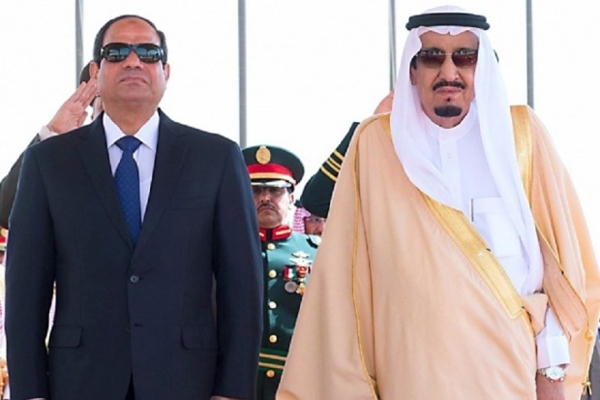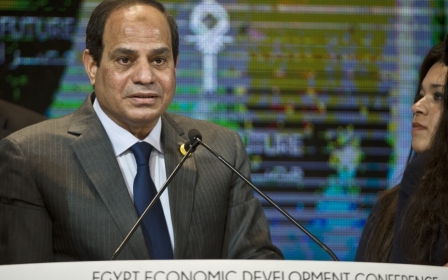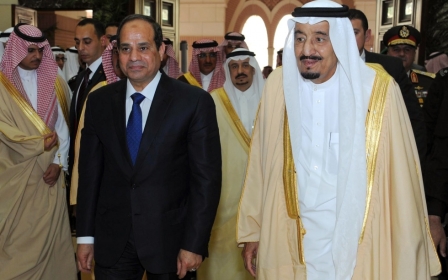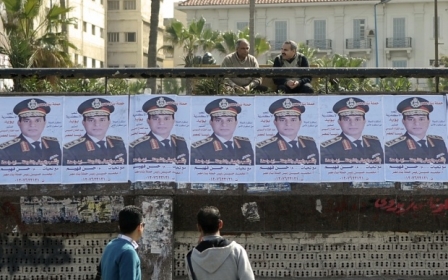Will Sisi hang the Muslim Brotherhood leaders?

In today's Arab world, it is becoming more and more difficult to isolate the internal affairs of a specific country from the regional and international dynamics. Egypt is no exception; it is a case where the regional plays a fundamental role in how local decisions are taken by the head of the 3 July military coup.
How will Egyptian President Abdel Fattah al-Sisi deal with the leaders of the Muslim Brotherhood (MB) in light of the consecutive death verdicts issued against them by a number of judges that are widely seen as affiliates of the regime? A big portion of the answer, as in many other cases, lies in understanding the new regional dynamics currently shaping up.
Sisi's regime is desperate for money to a point that may threaten the regime's survival; it has been living off Gulf aid for about 20 months, despite Sisi's disdain for Gulf leaders. Saudi Arabia, Kuwait and the UAE flooded the regime with over $30 billion to keep its economy afloat. However, the money was spent with no announced economic development plan. Now, the regime is asking for more money to keep things running and avoid major public discontent, which came in through the recent "Egypt the Future" donor and investor conference in Sharm el-Sheikh.
In order to keep the Saudi money flowing into Egypt, Sisi needs to cater new policies toward the Kingdom under King Salman bin Abdulaziz al-Saud. The Sunni kingdom is threatened by the control of Shiite Houthis over its neighbouring Yemen - a part of the overall rapid increase of the Iranian regional power and infiltration - and to be able to counter that threat, Salman needs to forge a strong coalition with the powerful Yemeni branch of the MB. This is something that could not take place until the Sisi regime lifts its brutal fist off the MB in Egypt.
Fundamental questions
Yet, what would make the strong US ally forge an alliance with an Islamic group, the removal of which the US supported in 2013? Couldn't the US just support international pressure to help the legitimate Sunni president regain control in Yemen so that the security of the US’s oil-rich strategic ally would be preserved?
Here arises the complexity of undergoing regional political shifts.
The current main threat against US interests in the Arab world is the Islamic militant movements. They are threatening stability in Iraq, Syria, Yemen and Libya. To be able to intervene effectively, the US has framed the war against the Islamic State (IS) as a part of the unending "War on Terror" adventure. The real target of this war is Islamic militant movements in the region, not limited to Iraq, which is why in his speech US President Barack Obama "made it clear that we will hunt down terrorists who threaten our country, wherever they are", and is desperate to secure congressional approval for further expansion of the war.
Because the Obama administration is against putting boots on the ground and it "cannot do for Iraqis what they must do for themselves", it is using local forces to confront IS. Surprisingly, the most powerful US ally on the ground in this war is Iran and its affiliates. And because there is nothing free in politics, Iran is renegotiating its nuclear program and getting a free hand in the region. Yemen is one victim.
Syrians are another victim, where the US will most probably push towards reconciliation rather than the removal of Assad. One piece of evidence of this is the controversial Kerry remarks stating that US officials "have to negotiate" with Assad. The State Department was keen to denounce the comment right away, saying that "by necessity, there has always been a need for representatives of the Assad regime to be a part of this process. It has never been and would not be Assad who would negotiate - and the Secretary was not saying that today".
Saudi on the Defence
With ongoing Iranian expansion and a possible deal regarding its nuclear programme, Saudi Arabia is on the defence. The US and its allies, along with Russia, are aiding its Shiite archenemy. Salman is looking to other allies for support. And a new shape of the Middle East gets to develop.
US, Russia, Iran, Syria, Iraq, Lebanon and Yemen, all sit on one side, while Saudi Arabia, most of the Gulf, Turkey, and Qatar are on the other, with possible Israeli cooperation. These alliances are by no means permanent or clear-cut; they are more or less tactical for a specific aim.
Yet, Salman is trying to widen this new block as far as he can to confront Iran; which is a change of policy than his predecessor Abdullah who saw Islamic militant movements as the main threat to the kingdom.
Hamas, which was classically supported by Iran and housed by Assad in Syria, is seemingly moving to the Saudi camp, given a fast improvement in relations. Hamas' leader Khaled Meshaal is expected to visit Riyadh soon.
At the same time, Salman is looking to include Sisi.
Where does Sisi stand in all of this?
The tension between Salman and Sisi has been very clear since the king's first day in office. Yet, with the recent $4 billion Saudi investment during the Sharm el-Sheikh conference, it is clear that Riyadh is willing to play with some carrots on a stick when it comes to Sisi.
Salman's delicate game is to drag Sisi away from the Iranian camp and at the same time force reconciliation with the MB, all given the fact that he has cash Egypt needs. Sisi desperately needs the money, but can't afford to allow the MB back to the political life.
Sisi, seemingly, has tried testing his own stick with the Saudis. On 2 March 2015, Deif-Allah al-Shamy, a prominent member of the Houthis, wrote on his Facebook page that he was about to arrive in Cairo as a part of a delegation to discuss "bilateral cooperation". Two days later, the Egyptian foreign ministry denied holding a meeting with the Houthis.
In addition, in his 20 March interview with The Wall Street Journal, Sisi stated: “We are keen on a strategic relationship with the US above everything else. And we will never turn our backs on you - even if you turn your backs on us.” Apparently, both are diplomatic messages sent to the Saudi regime about the consequences of dumping the Egyptian pharaoh.
For now, Sisi is happily accepting the Saudi money and negotiating with hard-headed MB leaders.
The imprisoned chairman of the MB's banned Freedom and Justice Party, Dr. Mohamed Saad Katatni, indicated that Sisi's efforts to reconcile with the MB have been ongoing for some time. He said that the regime "had tried to negotiate with him a compromise on the blood of martyrs of the horrid massacres of Rabaa, Nahda, and the other inhuman bloodbaths after." Katatni "refused, condemning the military coup against the elected president [Mohamed Morsi] and the democratic process," according to the MB's official website.
The breaking point
Yet, the new strategy Sisi seems to be following is to push MB members to their breaking point through the recent death penalties issued against senior MB members, including Mohamed Badie, the group's spiritual leader.
If the MB leaders gave up and accepted reconciliation, then the death penalties will either be revoked by a presidential pardon or retrials will take place; at which time the media will propagate that the MB members are not all the same, that some are moderates and some are extremists, and Sisi's war is against the extremists and not all MB members.
However, if, as expected, MB leaders refuse the reconciliation and at the same time Salman is stubborn about such a demand as a precondition for aid continuation, then the short-lived diplomacy Sisi has been recently trying hard to pick up will settle to its resting place. A bloodbath might take place, with possible violent backlash on the streets, limited to specific opposition groups.
If the judicial murders are coupled with harsher economic pressures than the ones Egyptians are witnessing today, then wider uncontrollable street discontent is likely to take place.
- Abdelrahman Rashdan is a political scientist specialised in national security and the Middle East.
The views expressed in this article belong to the author and do not necessarily reflect the editorial policy of Middle East Eye.
Photo: The tension between Salman and Sisi has been very clear since the king's first day in office (Saudi Press Agency)
New MEE newsletter: Jerusalem Dispatch
Sign up to get the latest insights and analysis on Israel-Palestine, alongside Turkey Unpacked and other MEE newsletters
Middle East Eye delivers independent and unrivalled coverage and analysis of the Middle East, North Africa and beyond. To learn more about republishing this content and the associated fees, please fill out this form. More about MEE can be found here.





